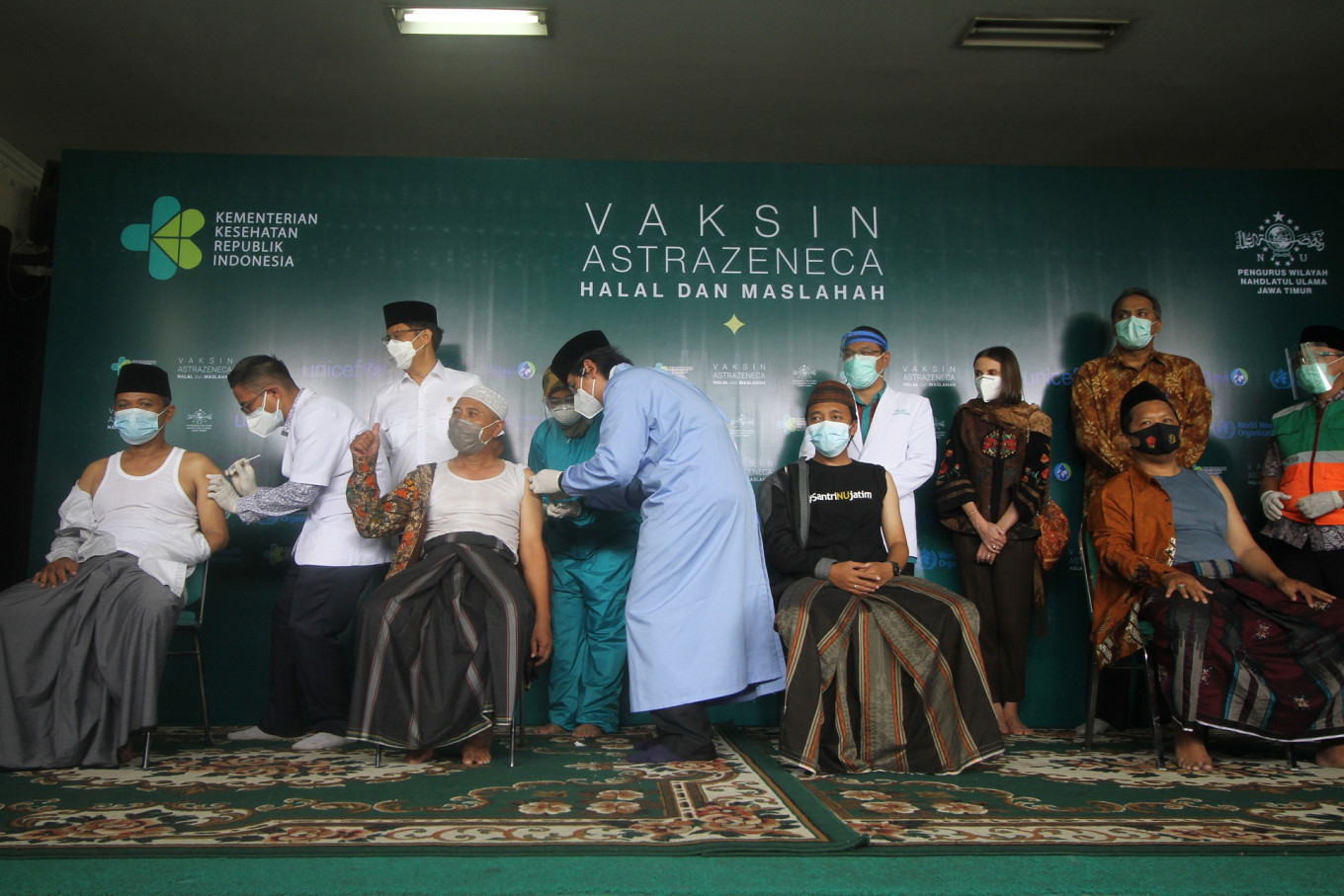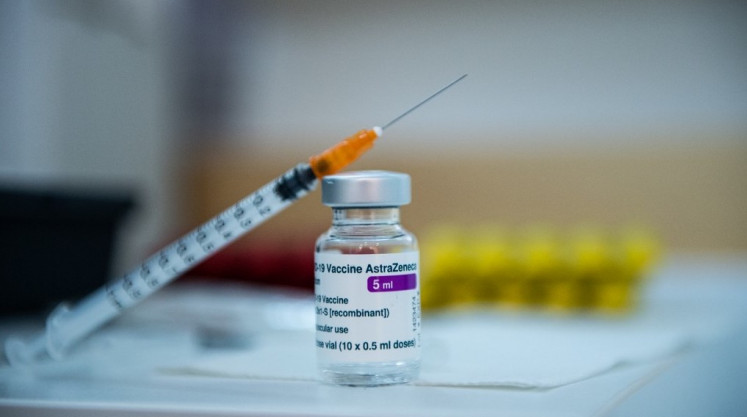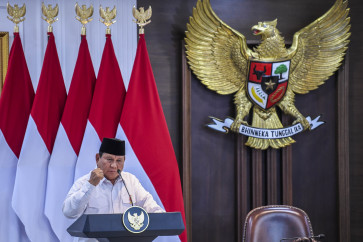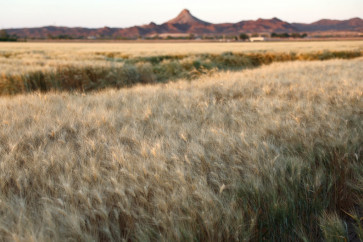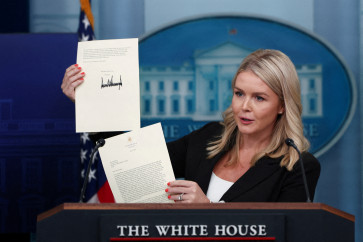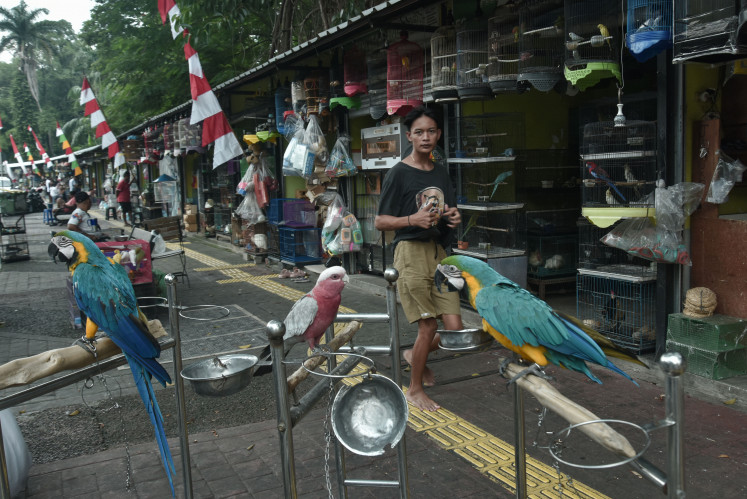Popular Reads
Top Results
Can't find what you're looking for?
View all search resultsPopular Reads
Top Results
Can't find what you're looking for?
View all search resultsFollowing MUI fatwa, AstraZeneca jabs sent to regions
Local leaders deem vaccine halal despite council's haram declaration
Change text size
Gift Premium Articles
to Anyone
A
uthorities have distributed most of Indonesia's AstraZeneca vaccine doses to East Java, where local religious leaders have deemed the vaccine halal, in opposition to the central Indonesian Ulema Council (MUI), which has declared it haram but has made a special allowance for the emergency circumstances.
Most of the remaining doses have been sent to regions of the country with relatively few Muslims.
The vaccine’s distributor, state-owned pharmaceutical company Bio Farma, shipped 45,000 of the 113,600 AstraZeneca vaccine vials in the country to East Java on March 20. One vial consists of 10 vaccine doses.
The firm's spokesperson, Iwan Setiawan, said in a statement that the Health Ministry had instructed the firm to distribute the vaccine to the province. On the same day, the ministry also instructed Bio Farma to send 5,000 vials each to Bali and East Nusa Tenggara (NTT).
On Monday, the firm sent 5,000 vials each to Jakarta, the Riau Islands and North Sulawesi. Bio Farma is awaiting instruction from the Health Ministry on the distribution of the remaining vials.
Read also: Indonesia ready to start using AstraZeneca jab after suspension
The Food and Drug Monitoring Agency (BPOM) approved the vaccine for emergency use on March 19, after a brief delay over concerns about adverse effects.
The Indonesian Ulema Council’s (MUI) edict board, however, declared the vaccine haram, claiming a pork-derived trypsin was used in the vaccine’s production, an assertion that AstraZeneca denies. But the council eventually permitted the widespread use of the vaccine because of the emergency situation.
Muslims make up 96 percent of the population of East Java, the home base of Indonesia’s largest Islamic mass organization, Nahdlatul Ulama (NU). Meanwhile, about 85 percent of Jakarta’s population is Muslim.
NTT, Bali and North Sulawesi have among the lowest proportions of Muslims in the country. According to Statistics Indonesia data from 2010, Muslims comprise 9.05 percent, 13.37 percent and 30.9 percent of the respective populations of the provinces.
Islamic leaders in East Java appeared to be on a different page than the central MUI regarding the AstraZeneca vaccine as they received the jab during a vaccination drive on Monday. President Joko “Jokowi” Widodo also attended the drive.
“The President has heard opinions and responses from the kyai [Islamic religious teachers] and heads of Islamic boarding schools that the AstraZeneca vaccine is halal and thayyibah [good],” East Java MUI head Moh. Hasan Mutawakkil Alallah said in a video uploaded to the Health Ministry’s YouTube channel.
He was among the first to receive the jab during the vaccination drive for religious leaders, Islamic boarding school students and public workers, which was carried out by the Sidoarjo and Jombang administrations.
This photograph shows a syringe poses on a vial of AstraZeneca anti-covid-19 vaccine in a pharmacy in Paris on March 12, as pharmacies have been authorized to give COVID-19 vaccinations -- for the first time in the vaccination campaign in France. (Agence France Presse/Martin BUREAU / )The haram edict has raised concerns about vaccine hesitancy in Indonesia, which has the largest Muslim population in the world, with more than 220 million people identified as followers of the religion. In a January survey by pollster Indikator Politik Indonesia, 81.9 percent of the 1,200 respondents said they would only accept the vaccine if it was declared halal.
The Indonesian Ulema Council Assessment Institute for Foods, Drugs and Cosmetics (LPPOM MUI) said its review of the AstraZeneca vaccine was conducted after Bio Farma registered the vaccine – which was produced by South Korean firm SK Bioscience – for an assessment on Feb. 19.
LPPOM MUI executive director Muti Arintawati said the institute assigned two leading drug and vaccine auditors with expertise in bioprocess engineering and industrial microbiology to audit the vaccine. The inspectors considered a dossier sent by the World Health Organization to the BPOM, as Indonesia had received the doses through COVAX, a multilateral vaccine initiative led in part by the WHO.
Muti said the audit team had also reviewed an assessment report by the European Medicines Agency (EMA). She said the dossier contained information that trypsin obtained from porcine pancreas had been used in preparing the virus host and the seeds used for the vaccine’s production.
The Jakarta Post looked into the EMA's assessment report and did not find any mention of “porcine” or “pork”.
“AstraZeneca can be registered again for [halal] certification if it doesn’t use pork derivatives in its production. If the condition remains the same as it is now, our result won’t change,” Muti told the Post on Thursday.
In 2018, the central MUI declared the measles-rubella (MR) vaccine mubah (permitted for use by Muslims) even though it contained pork derivatives. But local ulema councils opposed the vaccine, making some Muslims hesitant to receive it.
An official involved in the MR vaccination program said the experience offered a lesson that the government should involve local religious leaders in vaccination programs.
Indonesia is expecting to receive another 10 million doses of the AstraZeneca vaccine from COVAX by May.
Read also: No fatal side effects from COVID-19 vaccines reported as fear looms among Indonesians
MUI fatwa commission head Asrorun Niam Sholeh previously called on the government to work on securing halal vaccines. He also said that the organization’s recommendations on vaccines could change if conditions changed, such as emergency situations, fatal risks if people did not take the vaccine, insufficient supplies of halal vaccines and safety assurances from authorities.
AstraZeneca has reportedly issued a statement saying its vaccine does not contain any products derived from animals, including pigs.
Dicky Budiman of Australia’s Griffith University noted that Islamic councils in Australia and the United Kingdom had declared the AstraZeneca vaccine halal. He also urged Islamic Cooperation Organization (OKI) countries to be on the same page regarding the halal status of medical products.
Deputy Religious Affairs Minister Zainut Tauhid Sa’adi released a statement on Monday urging the public not "make a controversy out of the differences of edict in the AstraZeneca vaccine halal [status]" as the vaccine was able to be used in emergency situations despite the differences.
“In religious teachings, protecting the safety of human beings must be prioritized,” he said.

